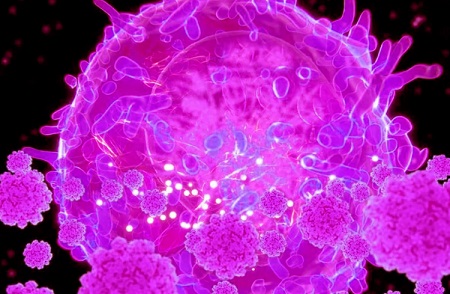Scientists from Denmark Uncover a Critical Immunological Puzzle in COVID-19 Severity
Nikhil Prasad Fact checked by:Thailand Medical News Team Mar 31, 2025 3 weeks, 1 day, 5 hours, 53 minutes ago
Medical News: A groundbreaking study led by researchers from the Department of Health Technology at the Technical University of Denmark, the Copenhagen University Hospital’s Department of Hematology, and the University of Copenhagen’s Department of Clinical Medicine has revealed how differences in the function and behavior of a specific type of immune cell - CD8+ T-cells - may influence the severity of COVID-19 outcomes.
 Scientists from Denmark Uncover a Critical Immunological Puzzle in COVID-19 Severity
Scientists from Denmark Uncover a Critical Immunological Puzzle in COVID-19 Severity
CD8+ T-cells, also known as cytotoxic or “killer” T-cells, are essential players in the immune system. They track down and destroy virus-infected cells, helping to limit the spread of infection. But according to this
Medical News report, not all CD8+ T-cells act equally in people infected with SARS-CoV-2, the virus that causes COVID-19.
Too Much of a Good Thing Can Be Dangerous
The study followed 73 patients infected during the first wave of the pandemic for over 220 days. Among them, 36 had severe disease requiring hospitalization, while 37 experienced only mild symptoms. Using highly sophisticated molecular tools, the team examined how CD8+ T-cells responded to more than 550 different SARS-CoV-2 fragments, known as epitopes, which trigger immune reactions.
Surprisingly, patients with severe COVID-19 had more T-cell responses and higher levels of these cells in their blood during the early stages of infection compared to those with mild cases. However, despite their abundance, these T-cells in severe patients were poorly equipped to kill infected cells. They showed reduced production of critical molecules like perforin, granzyme B, and interferon gamma, which are essential for destroying infected cells.
In contrast, mild COVID-19 patients had fewer CD8+ T-cell responses, but the ones they did have were more potent. These T-cells demonstrated better cytotoxic function, increased energy metabolism, and signs of early transformation into long-lasting memory cells - suggesting a more effective and balanced immune response.
HLA Genetics and a Misguided Army of T-Cells
Another key finding involved the role of HLA (human leukocyte antigen) types, which are genetic markers that affect how the immune system recognizes foreign invaders. The HLA-A*01:01 type was found to be equally present in both severe and mild patients. However, those with severe disease had significantly more CD8+ T-cells targeting a specific viral fragment called TTDPSFLGRY - also known as the “TTD” epitope - linked to the ORF1 protein of the virus.
These TTD-specific T-cells appeared in high numbers but were functionally impaired in severe cases, showing signs of being exhausted and metabolically dysregulated. These findings suggest that in some people, the immune system mounts an overwhelming yet inefficient response, pouring resources into dysfunctional T-cells that fail to control the virus effectively.
Vaccination Restores Bala
nce and Expands T-Cell Arsenal
The researchers also studied how mRNA vaccination (Pfizer or Moderna) affected these immune responses in people who had previously been infected. Among the 17 vaccinated participants, vaccination triggered both an expansion of existing T-cell responses and the emergence of new ones. This effect was seen regardless of whether the individual had severe or mild illness during their initial infection.
Vaccination boosted not just the number of virus-fighting CD8+ T-cells but also their diversity and functionality, especially in those who initially had weaker immune responses. It expanded the memory T-cell pool, enhanced antibody levels, and restored some of the immune balance that had been skewed during natural infection.
Dysfunctional Memory and Delayed Recovery
At six months post-infection, both groups - mild and severe - retained long-term CD8+ T-cell memory, but the quality differed. Severe cases had memory cells dominated by the TTD epitope, which continued to show signs of poor cytotoxic function. Mild cases, on the other hand, had a broader set of memory T-cells with more balanced and effective profiles.
Additionally, single-cell analysis revealed that T-cells from mild cases had stronger early activation, higher expression of surface markers linked to memory and tissue migration, and were metabolically better prepared to handle infection. In contrast, T-cells from severe cases showed reduced TCR (T-cell receptor) downregulation upon stimulation - a sign of poor responsiveness to the virus.
The Bigger Picture
These findings offer a major insight into why some people experience more severe COVID-19 than others. Rather than a simple lack of immune response, severe illness appears to stem from a misguided immune strategy - an overabundance of T-cells focused on the wrong viral targets, combined with poor execution of their primary job.
The research also underscores the importance of vaccination, even for those previously infected. Vaccination can reshape the immune landscape, broaden protection, and potentially prevent a skewed immune response in future infections.
Conclusion
This study provides strong evidence that the quality, not just the quantity, of CD8+ T-cell responses plays a key role in determining COVID-19 severity. In severe cases, the immune system generates large numbers of virus-specific T-cells that are unable to effectively eliminate infected cells. This is partly driven by genetic factors such as HLA type, particularly HLA-A*01:01, which skews the immune response toward dysfunctional epitope recognition. Importantly, vaccination helps correct this imbalance by expanding both the diversity and function of CD8+ T-cells, making it a critical tool not just for prevention, but also for improving immune memory after infection. These findings may inform future vaccine design and therapeutic strategies that focus on improving the quality of T-cell responses in viral infections.
The study findings were published on a preprint server and are currently being peer reviewed.
https://www.biorxiv.org/content/10.1101/2025.03.25.644515v1
For the latest COVID-19 News, keep on logging to Thailand
Medical News.
Read Also:
https://www.thailandmedical.news/news/breaking-covid-19-news-indian-study-finds-dysregulated-metal-ion-homeostasis-in-cd8-and-cd4-t-cells-of-covid-19-positive-individuals
https://www.thailandmedical.news/news/pro-inflammatory-low-avidity-sars-cov-2-reactive-and-terminally-differentiated-cd8-t-cells-contribute-to-immunopathogenesis-of-long-covid
https://www.thailandmedical.news/news/new-insights-into-how-natural-killer-cells-fight-viral-infections
https://www.thailandmedical.news/pages/thailand_doctors_listings
https://www.thailandmedical.news/articles/coronavirus
